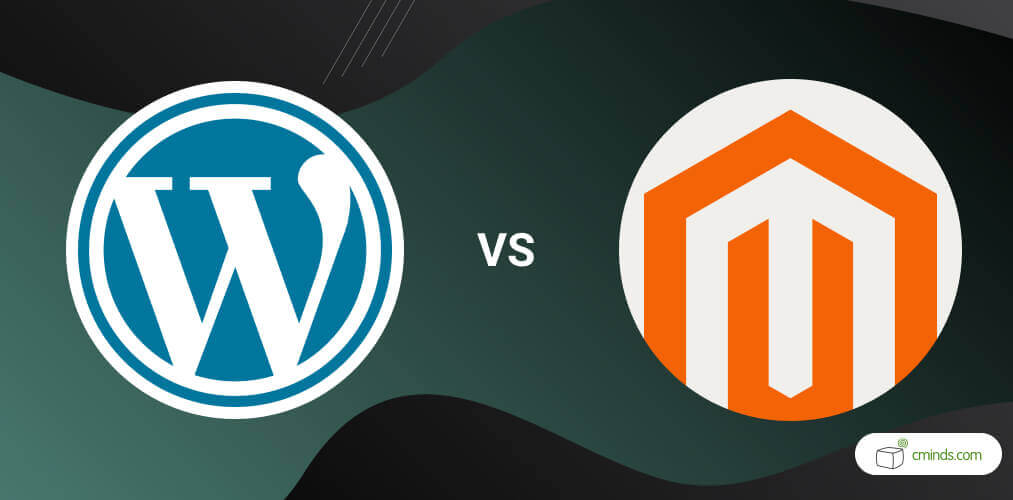CMS are online platforms providing tools for users to build websites. WordPress and Magento are two of the biggest – but which is best for you?

It’s estimated that two-thirds the active websites found online were built using CMS, and of these WordPress and Magento are certainly among the most popular. Now, at first glance, this might make both platforms sound pretty similar, but that’s far from the truth.
As you’ll come to see, both platforms were designed to cater to specific kinds of websites. So, when it comes to finding which CMS is best for you, the big question to ask yourself is simple:
What role is your website going to perform?
While you start thinking about that, let’s look at what both of these CMS offer by themselves.
December 2024 Offer – For a Limited Time Only:
Get WordPress 99+ Plugins Mega Bundle for 15% off! Don’t miss out!
WordPress: A Paradise for Bloggers (and Everyone Else)

WordPress was originally designed as a platform for blogging in 2003, and has since exploded in its popularity and versatility.
Now the most widely used CMS online, WordPress is renowned for being able to produce virtually any kind of website. Using WordPress is largely considered to be a very user-friendly experience, with total website customization being one of its most impressive features.
Perhaps best of all, whatever isn’t possible with WordPress after installation alone can be added with the help of plugins. There’s a whopping 56,000 plugins available on the WordPress marketplace, and that’s not including those made by 3rd party developers.
For reference, you can see the 3rd party plugins we’ve developed to enhance our customer’s WordPress experience here.
Magento: An Ecommerce Powerhouse

If your website’s goal is to sell products online through an Ecommerce webstore, Magento will likely be your perfect pick. The comprehensive Ecommerce platform was released publicly in 2008, and has since become a favorite for online sellers.
Note: Magento still ranks in top 10 for the most popularly used CMS in the world. Being a strictly Ecommerce focused platform, this makes its ranking alongside broader CMS platforms even more representative of its quality.
Like the plugins of WordPress, Magento offers extensions that are created by both 1st and 3rd party developers. There are over 3,000 to be found and browsed in the Magento marketplace. When installed, these extensions also increase the abilities of Magento websites by adding features such as automated store coupon distribution and multi-vendor functionality.
You can find 3rd party extension’s we’ve developed to assist with our customer’s Ecommerce efforts in Magento here.
The Difference Between Magento 1 and Magento 2
If you Google around, you’ll quickly notice there are currently two versions of Magento available, Magento 1 and Magento 2.
Magento 1 has been officially retired by Adobe in 2020, and Magento 2 represents an improvement in all regards.
Despite this, there are many Magento 1 webstores out there as Magento 2 was avoided by some users. At launch, the updated version seemed too unfamiliar for some users, and offered less extensions until recent versions. But today Magento 2 has notably more options than its counterpart, and many Magento 1 users are migrating over.
This means to avoid ending up with antiquated software, users getting into Magento for the first time should be sure start with its newest version, Magento 2.
The Difference Between Open Source (Community) and Cloud (Enterprise)
Magento 2 comes in two versions:
- The Magento Cloud (formerly Enterprise Edition) is a paid, tailor-made solution that provides higher performance and scale-ability for fast-growing and large businesses. It also gives you access to expert support, hosted cloud as well as hundreds of extensions and features that you can use to power your store and generally give you more control over your website.
- The Magento Open Source (formerly Community Edition) is available for free download and is more aimed for developers who know their way around Magento or alternatively for small businesses who want to hire a developer on their own behalf. This edition of Magento is an open source solution and gives you access to community support, as well as all basic Magento functions, such as adding product categories, user groups, coupons etc. In addition, you’d also be able to use cool features that are unique to Magento, like multistores, Related products, Up-sells and Cross-sells.
Comparing WordPress and Magento

Though they are often evaluated together, it isn’t entirely fair to place Magento and WordPress side-by-side in the same arena.
Yes, it’s true that WordPress and Magento have striking similarities. They are both designed to naturally encourage good SEO, provide ample personalization options, and foster strong support in their communities. Plus, they are both open-source software, and respectively have tons of plugins and extensions to customize and enhance website performance.
But both CMS don’t compete directly, as they stress different functions and appeal to their own separate types of user. Or in other words, WordPress and Magento are both really good at doing their own individual things.
For Example: While eBay owned Magento between 2011 to 2015, they still used WordPress for all their blogging purposes. This alone should show that the comparison between these CMS really isn’t so much about which is better than the other, but rather which is best suited for the task at hand.
The Final Verdict: Matching the Right CMS to You

In the end, the decision of which CMS platform to use comes down to how well your website’s specific needs match the platform’s functionality. Here’s a final rundown on WordPress and Magento.
Choosing WordPress
Those seeking the most broadly applicable and user-friendly option when designing a website that’s not based around buying and selling products will probably be happiest with WordPress. It offers tons of possibilities through the countless themes and extensions made by WordPress’ enormous community, including their own team.
There are even some Ecommerce plugins available that turn WordPress websites into fully operational webstores, like the massively popular WooCommerce plugin. However, when compared to the dedicated Ecommerce features of Magento, WordPress’ extensions don’t hold up as well.
The Bottom Line:
If you want to freely represent content on your website — whether it be videos, blog articles, or anything else — but don’t intend on including a complex marketplace or selling many products, then check out WordPress.
Choosing Magento
Websites being made to sell products or services, or engage in any other manner of profitable Ecommerce, will do better with Magento. It was created as a platform to enhance Ecommerce operations, and it does so exceptionally well.
While other website models, such as blogs, will technically work with Magento, they’re not as efficiently made when compared to the benefits of WordPress’ many design options. Not to mention Magento’s extensions are typically focused on Ecommerce processes, and far fewer types are available than WordPress plugins.
The Bottom Line:
If you’re building a website that primarily deals in products and services, whether digital or physical, look into Magento.
WordPress and Magento Integration
There is also another way – you can take the best from two worlds and integrate both of these CMS with each other. You can either integrate WordPress to Magento or vice versa. This way, you can build a perfect blog with a powerful online store.
Check out:


